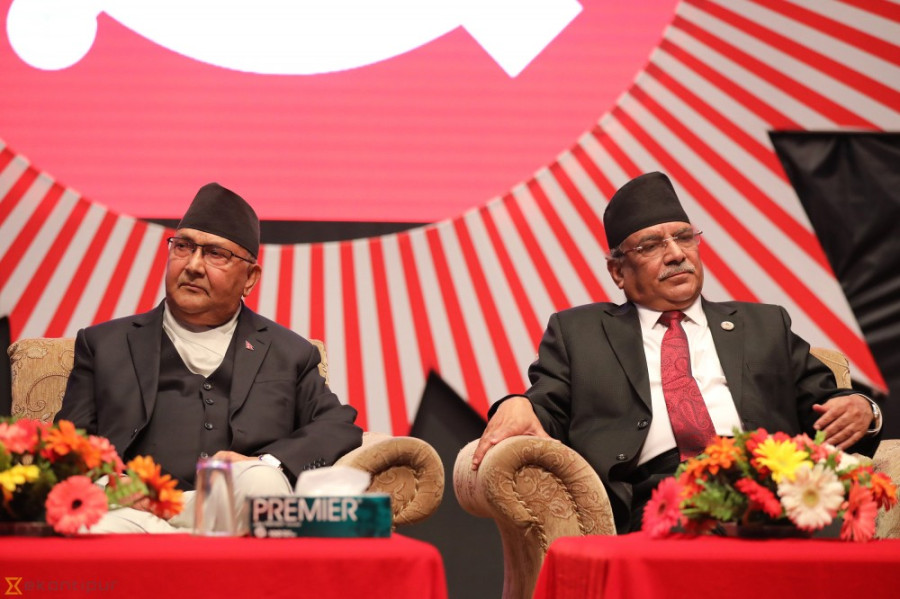Politics
United in haste, ideological schisms appear in ruling party
The merger was simply a marriage of convenience, say party leaders
Tika R Pradhan
When the Public Service Commission recently put out a notice for over 9,000 local level positions, opinions within the ruling Nepal Communist Party were sharply divided. While party leaders from the former CPN-UML stood in favour of the notice, those from the former Maoist party were against it on the grounds that the notice did not follow the principles of inclusion on par with the constitutional provisions.
Pampha Bhusal, Rekha Sharma and Janardan Sharma, all from the former Maoist party, have objected to the Public Service Commission’s notice. Even Shashi Shrestha, chairperson of the Parliamentary State Affairs and Good Governance Committee, which earlier this week instructed the Public Service Commission to terminate the vacancies, has said it violated the constitutional provision of proportional inclusiveness.
Shrestha is also from the former Maoist party.
However, lawmakers representing the former UML, including Bijay Subba and Jhapat Rawal, had stood in favour of the service commission’s competition for the jobs. Even former minister Mahesh Basnet, once chairman of the UML’s youth wing, was all for the notice.
The division over the notice is but one of the numerous instances where schisms have appeared in the ruling party—all because the merger between the two parties was a “marriage of convenience”, say some leaders, and not an ideological union.
On the controversial Guthi Bill, Basnet and lawmaker Krishna Rai, also formerly of the UML, were in support while lawmakers representing the former Maoists, including Pampha Bhusal and Agni Sapkota, vehemently opposed the bill.
The primary bones of contention between the two former parties appear to be federalism and inclusion, which manifested in the divide over the constitutional commission’s notice. Former Maoist leaders say that the erstwhile UML was never really serious about federalism.
“It seems that the party leadership, especially those representing the former UML, are not serious about making federalism successful,” said one former minister speaking on behalf of the Maoist faction. “The notice not only violates constitutional provisions but would ultimately lead to federalism failing as the local federal units would not be able to afford such a large number of employees.”
Before the UML and the Maoist Centre merged last year to form the country’s largest Communist party, the two had often been at odds with each other, facing off on ideology, primarily the issue of inclusion and identity politics. This long-simmering argument appears to surface again, with recent statements from both co-chairs to opposite ends.
Prime Minister KP Sharma Oli, who shares the NCP leadership with Pushpa Kamal Dahal, recently said at a programme in Pokhara that communal issues were being raised to weaken the government.
“As power centres are actively attempting to derail unity in order to make the country unstable, the country needs to rise above narrow ethnic and regional issues with positive thinking,” Oli had said.
Previously, after the fall of his government in 2016, Oli had admitted in a televised interview that his party had only “accepted” federalism and inclusiveness at Dahal’s insistence. And prior to the merger, Maoist leaders had said that they had “dragged” Oli and his party to federalism and republicanism.
Co-chair Dahal, meanwhile, has taken to publicly saying that his fight for inclusion is not over yet. “The fight for identity is ongoing, as disadvantaged groups have not received their rights yet,” Dahal said at a function organised by the Kirat community at the Rastriya Nachghar on Wednesday.
Identity and representation were largely Maoist agendas, ideological pillars on which they fought the 10-year-long insurgency. After the end of the conflict in 2006, the Maoists and the Madhes-based parties had brought these agendas into mainstream politics.
The UML, on the other hand, was largely seen to be hesitant to embrace these ideals.
When the two parties merged, their ideological divisions remained but were simply subsumed by practicalities, say leaders. As proper discussions were never held on the agenda, ideology and political line of the new Nepal Communist Party (NCP), misunderstandings, opposition and rifts are reappearing.
“The differences that have surfaced among the party lawmakers have arisen because both sides have taken stances according to their schooling,” said Mani Thapa, an NCP standing committee member.
Ideology was never a meeting ground for the two parties, according to party leaders. The Maoists, who were more certain in their agendas, agreed to the merger without the necessary preparations for it, attracted by the UML’s extensive organisational structure. The UML, on the other hand, wanted strength in numbers, which the unity with the Maoists could bring.
A number of leaders, including Thapa, expressed little surprise that these were now coming to the fore.
“This was inevitable,” said Mani Thapa. “The issue of identity has now erupted and the views of the lawmakers are contradictory.”
This is all a result of the two parties merging in haste, he said.
“It was just a marriage of convenience,” said Ghanashyam Bhusal, a standing committee member.




 8.67°C Kathmandu
8.67°C Kathmandu














